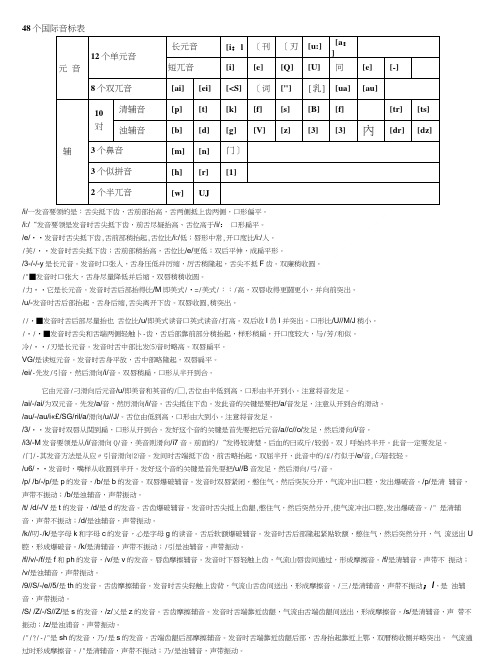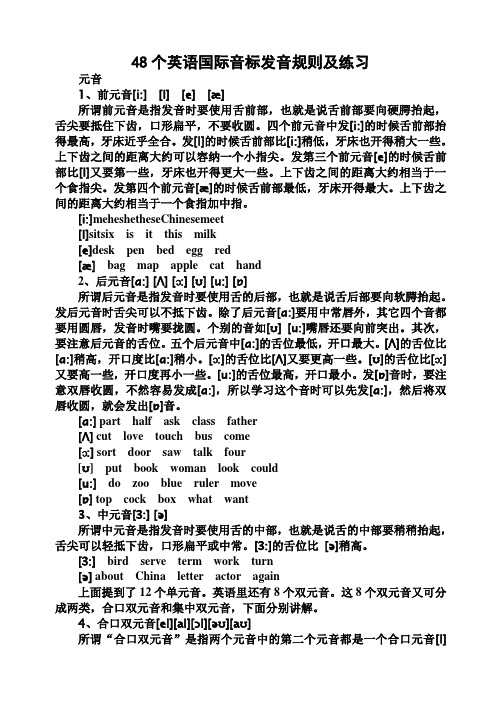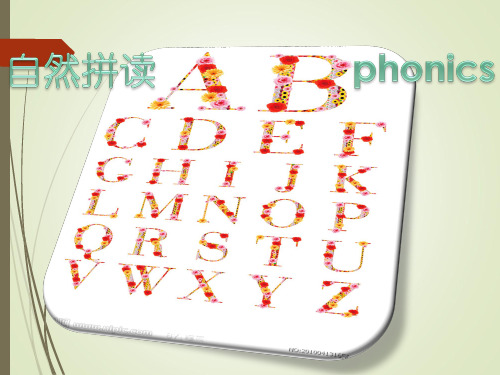纯正英音发音练习
- 格式:doc
- 大小:11.50 KB
- 文档页数:1

英语音标发音练习(完整版)1. 元音音标(Vowel Sounds)- /i:/:例如 `sheep`, `heat`,发音时嘴巴微微张开,舌头靠近上颚。
- /ɪ/: 例如 `sit`, `hit`,发音时嘴巴略微开合,舌头在嘴巴中间。
- /e/: 例如 `red`, `pen`,发音时嘴巴微微向前伸,舌头放在嘴巴中间。
- /æ/: 例如 `cat`, `hat`,发音时嘴巴大张,舌头放在下颚。
- /ɑ:/: 例如 `car`, `hard`,发音时嘴巴大张,舌头放在下颚。
- /ʌ/: 例如 `cup`, `but`,发音时嘴巴稍微张开,舌头放在中间。
- /ʊ/: 例如 `book`, `good`,发音时嘴巴稍微张开,舌头放在嘴巴中间。
- /u:/: 例如 `boot`, `food`,发音时嘴巴张开,舌头放在嘴巴中间。
- /ɒ/: 例如 `hot`, `dot`,发音时嘴巴大张,舌头放在下颚。
- /ɔ:/: 例如`law`, `ball`,发音时嘴巴张开,舌头放在嘴巴中间。
- /ə/: 例如 `about`, `letter`,发音时嘴巴稍微张开,舌头放在中间。
2. 辅音音标(Consonant Sounds)- /p/: 例如 `pen`, `spin`,发音时闭上双唇,突然张开。
- /b/: 例如 `bat`, `rab`,,发音时闭上双唇,用气声带发音。
- /t/: 例如 `top`, `cat`,发音时舌尖触到上牙龈。
- /d/: 例如 `dot`, `bed`,发音时舌尖触到上牙龈,用气声带发音。
- /k/: 例如 `cat`, `back`,发音时背部舌面和悬梁骨接触。
- /g/: 例如 `go`, `big`,发音时背部舌面和悬梁骨接触,用气声带发音。
- /f/: 例如 `finger`, `coffee`,发音时上牙齿底部和下唇接触。
- /v/: 例如 `very`, `move`,发音时上牙齿底部和下唇接触,用气声带发音。

48个国际音标表元音12个单元音长元音[i:l[刊[刃[u:][a:]短兀音[i][e][Q][U]冋[e][-] 8个双兀音[ai][ei][<S][词["][乳][ua][au]辅10对清辅音[p][t][k][f][s][B][f][tr][ts]浊辅音[b][d][g][V][z][3][3]內[dr][dz] 3个鼻音[m][n]门]3个似拼音[h][r][1]2个半兀音[w]UJ/i/一发音要领的是:舌尖抵下齿,舌前部抬高,舌两侧抵上齿两侧,口形偏平。
/i:/“发音要领是发音时舌尖抵下齿,前舌尽疑抬高、舌位高于/i/:口形扁平。
/e/••发音时舌尖抵下齿,舌前部稍抬起,舌位比/i:/低;唇形中常,开口度比/i:/人。
/芙/・・发音时舌尖抵下齿;舌前部稍抬高,舌位比/e/更低;双后平伸,成扁平形。
/3-/-/-y是长元音。
发音时口张人,舌身压低并厉缩,厉舌稍隆起,舌尖不抵F齿。
双廉稍收圆。
/"■发音时口张大,舌身尽量降低并后缩,双唇稍稍收圆。
/力・・它是长元音。
发音时舌后部抬得比/M即美式/•=/美式/::/高,双唇收得更闘更小,并向前突出。
/u/-发音时舌后部抬起,舌身后缩,舌尖离开下齿。
双唇收圆,稍突出。
//・■发音时舌后部尽量抬也舌位比/u/即美式读音口英式读音/打高。
双后收I员I并突出。
口形比/U//M/J稍小。
/・/•■发音时舌尖和舌端两侧轻触卜-齿,舌后部靠前部分稍抬起,样形稍扁,开口度较大,与/芳/和似。
冷/・・/刃是长元音。
发音时舌中部比发⑸音时略高。
双唇扁平。
VG/是读短元音。
发音时舌身平放,舌中部略隆起,双唇扁平。
/ei/-先发/引音,然后滑向/i/音。
双唇稍扁,口形从半开到合。
它由元音/刁滑向后元音/u/即美音和英音的/□,舌位由半低到高,口形由半开到小。
注意将音发足。
/ai/-/ai/为双元音。
先发/a/音,然厉滑向/i/音。
舌尖抵住下齿。
![[练习]48个国际音标发音技巧完全归纳[1]](https://img.taocdn.com/s1/m/d5a17b5279563c1ec5da7177.png)
[练习]48个国际音标发音技巧完全归纳[1] 英语48个国际音标规律A) 前元音[e]的发音方法/ /美式发音符号/e/英式发音符号/e/传统的国际音标的读音符号该音是个前元音,是字母e或ea在单词中的发音。
它是个短元音。
发音时舌尖抵下齿,舌前部稍抬起,舌位比/i:/低;唇形中常,开口度比/i:/大。
李阳疯狂发音秘诀:1.舌尖抵下齿,舌前部稍微抬起,舌位比/I/低。
2.唇形扁平,嘴唇向两侧微分,比/I/稍松开,上下齿之间的距离相当于一个中指。
3.美音/ε/的舌位比英音[e]的稍低,口形比[e]稍宽。
4.发音时下巴逐渐向下移动,直至上下嘴唇张开的角度大约呈“45度”,同时发出声音。
5.常发这个元音的有:字母“e”和字母组合“ea”。
6.字母“a”和字母组合“ai、ay、ei、ie、ue”等也可发这个音,但出现较少。
B) 前元音[æ]的发音方法/ /美式读音符号/ /英式读音符号/ /传统的国际音标的读音符号该音是个前元音,是字母a在重读闭音节中的发音。
//是短元音。
发音时舌尖抵下齿;舌前部稍抬高,舌位比/e/更低;双唇平伸,成扁平形。
李阳疯狂发音秘诀:1.发音时,双唇向两边平伸,张开嘴,嘴唇放松。
2.牙床介于半开和开之间,上下齿间可容下食指加中指尖。
3.舌尖轻触下齿,舌前部微微抬起,舌位比/e/低。
这个音是四个前元音中舌位最低、但开口最大的一个。
4.发音时逐渐压低舌头和下颚,尽可能夸张。
5.这个音属短元音,但在实际发音中有相当的长度。
6.这书最疯狂、最典型的美国发音之一,这个音发得越夸张,越到位,美国味就越浓~7.常发这个元音的除了字母“a”之外,字母组合“au”或“ua”有时也可能发这个音。
8.另外,有时候字母组合“ai”中“l”不发音,而“a”发这个大嘴音,如“half”、“calf”等。
9.英音中发元音[a:]的在位于/f/、/θ/、/s/或鼻音前时,美语中发音变为/æ/。

48个英语国际音标发音规则及练习元音1、前元音[i:] [І] [e] [æ]所谓前元音是指发音时要使用舌前部,也就是说舌前部要向硬腭抬起,舌尖要抵住下齿,口形扁平,不要收圆。
四个前元音中发[i:]的时候舌前部抬得最高,牙床近乎全合。
发[І]的时候舌前部比[i:]稍低,牙床也开得稍大一些。
上下齿之间的距离大约可以容纳一个小指尖。
发第三个前元音[e]的时候舌前部比[І]又要第一些,牙床也开得更大一些。
上下齿之间的距离大约相当于一个食指尖。
发第四个前元音[æ]的时候舌前部最低,牙床开得最大。
上下齿之间的距离大约相当于一个食指加中指。
[i:]meheshetheseChinesemeet[І]sitsix is it this milk[e]desk pen bed egg red[æ]bag map apple cat hand2、后元音[ɑ:] [Λ] [ɔ:] [ʊ] [u:] [ɒ]所谓后元音是指发音时要使用舌的后部,也就是说舌后部要向软腭抬起。
发后元音时舌尖可以不抵下齿。
除了后元音[ɑ:]要用中常唇外,其它四个音都要用圆唇,发音时嘴要拢圆。
个别的音如[ʊ] [u:]嘴唇还要向前突出。
其次,要注意后元音的舌位。
五个后元音中[ɑ:]的舌位最低,开口最大。
[Λ]的舌位比[ɑ:]稍高,开口度比[ɑ:]稍小。
[ɔ:]的舌位比[Λ]又要更高一些。
[ʊ]的舌位比[ɔ:]又要高一些,开口度再小一些。
[u:]的舌位最高,开口最小。
发[ɒ]音时,要注意双唇收圆,不然容易发成[ɑ:],所以学习这个音时可以先发[ɑ:],然后将双唇收圆,就会发出[ɒ]音。
[ɑ:] part half ask class father[Λ] cut love touch bus come[ɔ:] sort door saw talk four[ʊ] put book woman look could[u:]do zoo blue ruler move[ɒ] top cock box what want3、中元音[З:] [ə]所谓中元音是指发音时要使用舌的中部,也就是说舌的中部要稍稍抬起,舌尖可以轻抵下齿,口形扁平或中常。


第一步:寻找英语后腔发音的规律第五节:后口腔发音方法所发出的声音有五大特点第一大特点:低沉。
指说话的声音偏低,一般来说,人说话的声音越靠近喉咙里面,喉咙越打开,声音就越低越粗。
人说话的声音越高越尖,声音就越靠近口腔外边,英语用的是后部发声方法,用力和声音都靠近口腔里边,发出的声音较低,这是因为口腔后部发声时,使得整个喉咙随声带一起振动,振动体加大,发出的声音频率便较低。
用汉语说话时,口腔后部一般用力小,随声带一起振动的部分较少,振动体减小发出的声音频率便偏高,声音偏尖。
通过观察,不难发现:说英语的外国人多是又低又粗的低嗓门儿,连女性都如此,“男低音”、“女低音”很普遍;说汉语的中国人(包括大多数亚洲地区的人)一般说话的声音偏高、偏尖。
英语是用低嗓门说出来的,要学会用低沉的声音说英语,不扯着嗓子用尖尖的声音说英语,用尖尖的声音说话就会把声音移到了口腔的前部,就不是后部发声方法了。
刚开始用低沉的嗓音说英语或许会感觉非常不自然,这不要紧,练习一段时间后,你的嗓子就会发出这种声音,说英语时就会自动地切换到这种声音。
这就好比有的人会唱流行歌曲又会唱美声歌曲一样,唱不同的曲子用不同的声音。
第二大特点:响亮。
英语发音虽然偏低,但声音的响度却不减,力量敢较强,即频率虽低振幅大,声音的功率大,传的远。
特别是美语发音,声音十分洪亮,在嘈杂的环境中也可明显地听清楚。
后部发声方法在发声原理上类似于美声唱法,发音时,口腔内壁绷紧变硬,对声音的吸收少,音拢得紧,收得住,发音时用得上劲,因此声音响亮。
但要注意:英音比美音的响亮程度要弱得多。
第三大特点:硬度。
指发出的声音坚强有力,有硬度,有穿透力,是一种推不倒压不垮的声音。
发音起来很硬朗,这就是后口腔发音用力较大的结果。
第四大特点:内含。
指发音时声音有力地含在口腔后部,不外跑分散,好像发出的声音不是往口腔的外面走,而是要往里面走,从喉腔返回到体内。
第五大特点:粘度。
指发音时声音粘长,音和音之间粘连成一体,过渡有节奏,没有很重的爆破音。
如何练就地道英语发音1. 准确发音——嘴巴动起来要想准确发音,请记住两个关键:元音要饱满;辅音要干脆。
元音一定要发饱满、到位,特别是双元音。
但是很多童鞋往往会把双元音发成单元音,比如,把/ai/time读成[tem],/ei/make读成[mek],/au/cow读成[k],这样说出的英语时不准确不地道的。
之所以出现这样的问题是因为把汉语的发音方式带入到了英语中,用汉语的发音方式来说英语。
其实,汉语和英语的发声位置是有很大区别的:汉语发音时口腔前部运动幅度较大,声音比较尖,英语则是用口腔中后部发音,声音比较低沉。
英语元音是通过口腔和气流的运动来发声的,所以要发好元音一定要让整个口腔动起来,不要只动嘴皮子。
学习辅音,关键是要干脆,嘴皮子要利索。
比如我们常见的一个轻辅音/θ/,发这个音时,舌头要稍伸出,上下牙齿要轻咬舌尖,如果你是把this读成”zei si”,that读成”zai te”,那这个咬舌音你就真得要多加练习了。
辅音发音要短和轻,因为说汉语的习惯,我们发音时比较容易画蛇添足,在辅音后面加上一个元音,比如说把red 读成reder,把friend读成friender,不仔细听的话也听不出来。
说到这里,有没有躺着也中枪的童鞋呢?2. 把握节奏(rhythm)和语调(intonation) ——音乐唱起来汉语讲究字正腔圆,每个字都会清楚地读出来,而英语不是这样的,英语有轻重音节之分,一般来讲句子中的实词需要重读,比如说名词、实意动词、形容词、数词、量词以及代词等。
虚词都需要轻读,比如助动词、介词、连词等。
The streets are wide andclean.(streets/wide/clean要重读,the/are/and不重读。
)英语的整体感觉,和音乐一样,是有节拍的。
每个重音和他后面跟随的轻音节,构成了一个节奏群,每个节奏群在读的时候用的时间差不多。
也就是只要重音数相同的句子,念得时间大致是相同的。
英文发音不标准如何练Improving English Pronunciation。
English pronunciation can be a challenge for many learners, especially for those whose native language does not have similar sounds. However, with consistent practice and the right techniques, it is possible to improve your English pronunciation. Here are some tips on how to practice and improve your English pronunciation:1. Listen and repeat。
One of the most effective ways to improve your English pronunciation is to listen to native speakers and try to imitate their pronunciation. You can do this by watching English movies, listening to English songs, or even just paying attention to how native speakers pronounce words in everyday conversations. After listening, try to repeat what you hear and pay attention to the way your mouth, tongue, and lips move to produce the sounds.2. Use pronunciation guides。
1.Where do you live?2.Where do you live?3.I’d like a cup of herbal TEA. (A simple request)I’d like a cup of HER bal tea. (Not any other sort of tea)I’d like a CUP of herbal tea. (Not a mug)4.Do you mind if I Open the window?5.How long have you been in London?6.Why don’t you come to my PARty?7.WHY don’t you come to my party?8.If I’d seen him, I would’ve told him.9.i:bead, key, cheese, scene, police, people, quay10.I hit, sausage, biggest, rhythm, mountain, busy, women, sieve11.u book, good, woman, push, pull12.u:food, rude, true, who, fruit, soup13.e egg, left, said, head, read(past), instead, any, leisure, leopard14.əabout, paper, banana, nation, the(before consonants)15.ə:shirt, her, word, further, pearl, serve, myrtle16.ɔ:fork, call, snore, taught, bought, board, saw, pour, broad, all, law,horse, hoarse17.æhat, attack, antique, plait18.ʌrun, uncle, front, nourish, does, come, flood19.ɑ:far, part, half, class, command, clerk, memoir, aunty, hearth20.ɔdog, often, cough, want, because, knowledge, Australia21.Iəbeer, beard, fear, pierce, Ian, here, idea22.uəsure, moor, tour, obscure23.eəwhere, wear, chair, dare, stare, there24.eI cake, way, weigh, say, pain, they, vein25.ɔI toy, avoid, voice, enjoy, boy26.aI high, tie, buy, kite, might, cry, eye27.əu go, snow, toast, home, hello, although28.au house, loud, down, how, bough29.p/b pin/bin, cap/cab, happen, cabbage30.t/d to/do, hat/had, hotter, harder31.k/g cot/got, pick/pig, packet, forget, queue32.tʃ/dʒchurch, judge, nature, larger33.f/v fan/van, hoof, hooves, café, cover, phase, above34.θ/ðthink, the, bath, bathe, mathematics, father35.s/z sue/zoo, this, these, icy, lazy36.ʃ/ ʒshe, fish, beige, nation, measure37.h hello, behind38.m more, room, camera39.n no, on, infant, know40.ŋsing, sink, singing, sinking41.l live, pool, pulling42.r red, hurry,﹡party,﹡car43.j yes, young, usual, few, queue, educate, suit44.w wood, walk, wet, wheat, hallway47.SYLLabus? baNAna? kangaROO?48.a arise, syllable, bananae phenomenon, excellent, voweli pupil, experiment, communicateo tomorrow, button, developu support, bogus, difficult49. –ous conscious, fictitous-al spatial, capital, topical-ion session, pronunciation, attention-ate accurate, private, delicate50. SISter, BROther, MOther, WAter, PAper, TAble, COFfee, LOvelyQUIetly, oRIGinally, deFECtivePOSTman, NEWSpaper, TEApot, CROSSwordIMport(n), imPORT(v), Rebel(n), reBEL(V), INcrease(n), inCREASE(v)51. opportunity, telephone, substitute52. CORner53. Where is John’s house?It’s on the CORner.54. Where did you say John lives?he LIVES in the house on the CORner.55.John lives in the block of flats on the corner, doesn’t he?NO, he LIVES in the HOUSE on the corner.56.John’s buying the house on the corner, isn’t he?he ALready LIVES in the house on the corner.57.she can/kən/ swim faster than I can/kæn/.She’s from/frəm/ Scotland. Where are you from/frɔm/?60.↘she LIVES in LONdon↘she’s LIVED in LONDON∥↘SINCE she was TWENty↘ WHAT time does your TRAIN leave↘↗WHAT time does your TRAIN leave61.What’s your name? What’s the time? Where do you live?62.Is it the blue one? Have you got a pan?63.He lives in the house on the corner. It’s over there.64.Sit down. Put it on the table.65.You’re French, aren’t you? He’s very tall, isn’t he?66.You’re French, aren’t you? Your train leaves at six, doesn’t it?67.You need a pen, a pencil and some paper. The stall sells ribbon, beads,elastic and buttons.68.Is it the blue one? …No? Is it the red one, then? …OK, is it the greenone?69.A: Hello, my name’s Koyomi.B: Hi there, I’m Sara.A: Hello Sara, nice to meet you!B: Excuse me, Koyomi, you’re Japanese,↘aren’t you.A: Yes, that’s right. I’m from Saitama.B: I thought so. Your name sounds Japanese.A: And Sara, you’re Italian, ↗ar en’t you?B: Yes, that’s right, I’m from Torino, in the north-west.A: I see. I thought you were either Italian or Spanish. Would you like a coffee …70.↘do you MIND if I TURN the heating on↘do you MIND∥↘if I turn the heating ON↘could I POSSibly∥↘BORRow∥↘your newsPAper71.↘it’s over THERE∥↘on the T able ∥↘next to the NEWSpaper72.↘it’s over THERE∥↘on the T able ∥↘next to the NEWSpaper73.↘How do you DO74.↘↗ DONT get me WRONG75.↘↗I’m NOT sure whether to go to SPAIN∥↘↗or PORtugal76.↘WHAT do you make of that new TEAcher77.When you get to the office, you’ll see a tall man named Sean.78.When you see Sean, give him this letter.79.↘WHAT time does your TRAIN leave↘↗ WHAT time does your TRAIN leave↘ she’s LIVED inLONdon∥↘since she was TWENty↘he LIVES in the house on the CORner80.↘↗ she’s LIVED in LONdon∥↘since she was TWENty↘he LIVES in the house on the corner81.↘↗he MIGHT have been ∥↘↗aTTACKED by an ANimal↘↗ he COULD have been ∥↘↗aTTACKED by an ANimal↘↗ perhaps he was ∥↘aTTACKED by an ANimal↘↗ if he WAS attacked by an animal ∥↘he COULD have run aWAY ↘he CANT have been attacked by an animal∥↘That’s too EAsy 82.↘↗ he MIGHT have been∥↘↗PArachuting↘↗ he COULD have been∥↘↗PArachuting↘↗ perHAPs he was∥↘Parachuting↘↗ if he WAS parachuting∥↘he COULD have used a resERVE↘ he CAN’T have been parachuting∥↘THAT’S too EAsy83. ↘↗ do you KNOW where the BANK is please↘↗ could you TELL me ∥↘where the BANK is please84.Could you pass me that book, please?85.Can you see that boy over there?Where has the cat been all night?Who’s cute baby, then?86.1) He’s a rather fat boy.She’s got an apartment in Manhattan.He’s a very good boy.There are ten men in the class, and two women.2) Where has that cat been all night?Can you see that girl over there?It was a very good concert.She’s a very good girl.3) I’ve been going out too much lately.He’s bringing his own car.4) I really love this shiny one over there.5) We found this lovely little cheese shop in Paris.6) You went to France last year, didn’t you?7) Would you like a cup of tea?87. 1) We arrived the next day.When we reached Paris, we stopped for lunch.We bought a lovely carved statuette.2)She acts like she owns the place!Teachers use authentic texts to teach from.George the Sixth’s throne.3)I think we should call the police.I’ll love you forever, promise. Well, perhaps.It’s a question of collecting responsibility.Are you coming out tonight?That’s an interesting idea.Have we got any vegetables?4)My birthday’s on the 11th of November.It’s a complete waste of time!That’s the least of my worries!88.Her English is excellent.Her German is absolutely awful, though!My brother lives in London.My brother always phones at the wrong time.89.Princess Diana was a victim of media exploitation.The media are to blame.It’s a question of law and order.I saw it happen.90. I agree, wholeheartedly.I think, therefore I am.I am, therefore I ought to be.They are, aren’t they?91.Go on! Go in!Are you inside, or are you outside?Who is?You are.92. That’s my train.It might rain.The great apesThe grey tapesCan I have some more ice?Can I have some more rice?93.You’ll need an egg, an olive and an anchovy.(…a negg, a nolive and ananchovy)Put it on.(pu ti ton)It’s no joke.(snow)It’s tough.(stuff)94.1) I’LL walk with you to the station.2) I’ll WALK with you to the station.3) I’ll walk with YOU to the station.4) I’ll walk with you TO the station.5) I’ll walk with you to the STAtion.95.1) What am I doing?2)Yes, I am3)Those shoes are lovely!4)Yes, they are.5)I’ll see you at the party.6)What are you looking at?7)I can swim faster than you!8)Oh yes I can!96.1) I’m sorry but I really don’t know.2)Is this going to go here or there?3)That’s another big bill we’ve got to pay.4)That letters for you and this ones for me.5)I’d like to offer you the job.97.1) ↘WHAT’S your NAME2)↗WHAT’S your NAME3)↗WHAT color is your CAR4)↘WHAT color is your CAR5)↘you’re FRENCH ↘AREN’T you6)↘you’re FRENCH↗AREN’T you98. 1) It’s in that box.2) There are eleven players in a soccer team.3) Can you see that kid over there?4) There are ten cups on the table.5) I’m going to give up smoking this year.99. 1) We finally arrived the next day.2) This is Everton’s last chance to win the league.3) We had a cold lunch in a small bar.4) If you visit Britain, you must try some fish and chips.5) Her mum always served sherry on Christmas morning.[文档可能无法思考全面,请浏览后下载,另外祝您生活愉快,工作顺利,万事如意!]。